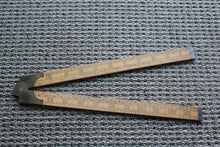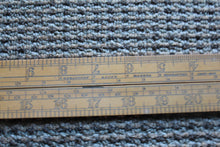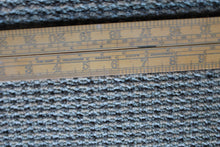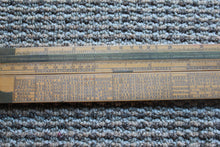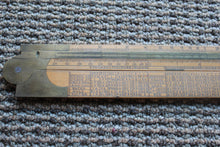
Vintage T. BRADBURN & SONS BIRMINGHAM 24” TWO FOLD Engineer’s Gunter Slide RULE
THOMAS BRADBURN & SONS MAKERS - BIRMINGHAM ENGLAND -ESTABLISHED 1834
Two-fold boxwood Engineer's rule with arch joint
This example is graduated with I. Routledge tables for making all kinds of calculations
It has a brass Gunter's slide and steel tips
Both pins are in place and fir tight
Brass rule slides easily
Engraved on front “T.BRADBURN & SONS MAKERS WARRNTED BEST BOX”
A very nice example of a vintage Engineer's rule by Thomas Bradburn for you to add to your antique measuring tool collection
At first glance we have here a simple wooden ruler, with many scales of unclear purpose
Don’t be deceived, though: this is a key development in the history of computing devices.
Known as Gunter’s Rule, or simply a “Gunter”, this is the invention of Edmund Gunter (1581-1626), a London scholar and contemporary of John Napier, the Scottish inventor of Logarithms. Napier published the first table of logarithms in 1614, and armed with it one could replace multiplication and division with addition and subtraction of the equivalent logarithms -- a clear benefit if you have to calculate by hand, as they certainly did in the 17th century
Known as Gunter’s Rule, or simply a “Gunter”, this is the invention of Edmund Gunter (1581-1626), a London scholar and contemporary of John Napier, the Scottish inventor of Logarithms. Napier published the first table of logarithms in 1614, and armed with it one could replace multiplication and division with addition and subtraction of the equivalent logarithms -- a clear benefit if you have to calculate by hand, as they certainly did in the 17th century
Still, it was one boring and laborious task, which Gunter did away with
Condition
Fine
No issues noted
See all pictures
Please contact us with any questions!
13






